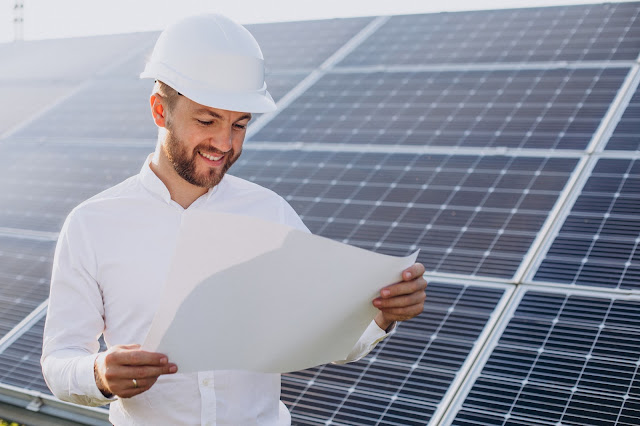What Are Solar Panels and Why Do You Need One?
What are solar panels?
A solar panel is a group of solar
cells that are electrically connected and convert sunlight into electrical
power. Also known as PV panels, these devices can be used for a wide range of
applications. Some examples of power generation through commercial and
residential solar energy systems would be telecommunications equipment, remote
power systems for cabins, and remote sensing. You can buy high-quality solar products for your home or office in India.
How are solar panels made?
PV panels contain solar cells,
also known as photovoltaic cells. These cells are made of semiconductors, such
as silicon, that convert sunlight into electricity. So, when light enters the
cells, electrons break from the atoms and move through the cells, generating
electricity.
Today, photovoltaic cells in home
installations can convert about 20% of sunlight into electricity. While some
commercial systems can reach 40% of solar efficiency. However, with
technological advances, solar efficiency expands accordingly and prices fall.
Why should you use solar panels?
Solar panels have gained
popularity over the years as they offer many advantages. Here are some reasons
why you should consider using PV panels.
Reduce the cost of electricity
bills: PV panels generate electricity from the sun, so you buy less electricity
from the grid. Since the energy from the sun is free and renewable, you don't
need to pay for the electricity generated from the PV panels. This means you
spend less on your electricity bills and save more. Moreover, with the best
solar inverter, your electricity problems can be easily solved.
It is a great source of renewable
energy: PV panels can generate electricity directly from the sun, so it is a
renewable source of energy. Anyone and everyone can take advantage of free
energy from the sun without worrying about running out of power. Instead, we
can enjoy free clean energy that does not emit any greenhouse gases.
Safe for the Environment: Solar
is a natural source of energy; therefore, it is renewable, clean, and zero
emission. It does not emit greenhouse gases, so it is environmentally friendly
and does not harm the planet.
Ensures good return on
investment: Installing solar panels is a great investment option for
homeowners, and they will get the money back within a certain period of time.
Although the installation cost of PV panels is high, you will save a lot of
money on electricity bills. This way, you will earn a return on the initial
investment you made while installing the panels.
Do solar panels require maintenance?
Maintaining solar panels is not a
difficult task, once installed, they do not require any special service or
maintenance. Just make sure the panels are not stained by anything and are
clean. Remember to get a sloping roof so that rain and dirt can run off easily.
How long do solar panels last?
PV panels come with a long-term
warranty of 25 years or more. But you can easily use it for 30 to 40 years
without any worries.
How often should you clean your solar panels?
To ensure the productivity and
effectiveness of your solar panel, you should clean it every 6 months to 1
year. However, depending on your location, pollution, and dirt level, the
frequency of cleaning should increase.
Do solar panels work in the rain?
PV panels perform best in direct
or indirect sunlight, although direct sunlight is the best option. However,
even in cloudy environments, solar panels can still work. Also, the rain really
helps keep the panels clean. This removes dirt and dust that can accumulate in
the panels over the years.
So, if your area has a strong
metering policy, the excess energy generated by your panels will help you store
it so you can use it at night and at other times when the panels are working at
full capacity. to be unable for high-quality solar products in India, you can
always contact us.
How many hours of sunlight does your panel need to work
optimally?
Generally, the panels work best when the sunlight is direct and the sun is at its highest position. So, sunlight should reach the panels between 10 am and 3 pm for the panels to work optimally. However, if there is an obstruction such as a shade etc., you should consider reducing the shading so that sunlight can reach the panels properly.
Visit our website: https://mintsolarspl.com/



Comments
Post a Comment